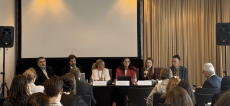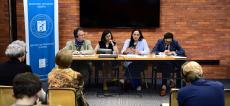
The case of the Batumi New Mosque
Statement of the Batumi New Mosque Construction Fund, the Tolerance and Diversity Institute and Social Justice Center
A court action commenced in 2017 for a permit to construct a new mosque in the city of Batumi continues, as the Supreme Court of Georgia recently returned the case to the Court of Appeal for its reconsideration. The legitimate request for the permit stems from the long-standing needs of the Muslim community, and the issue remains unsolved.
The decision of the Supreme Court contains a number of problematic elements, which not only hinder the realization of the fundamental rights of Muslims but also could lead to the undermining of the general principles of the right to freedom of religion and equality under the law. The court action, which has dragged on for seven years, is now prolonged indefinitely by this latest decision, grossly violating the rights of the Muslim community and threatening the essential principle of speedy and effective justice.
By the ruling of May 25, 2023, the Administrative Affairs Chamber of the Supreme Court (composed of the following judges: Maya Vachnadze, Ketevan Tsintsadze and Bidzina Sturua), endorsed, in part, the cassation appeals of both the Batumi New Mosque Construction Fund and the Batumi Municipality City Hall, cancelled the Judgment of Kutaisi Court of Appeal of April 13, 2021, and returned the case to the same court for retrial.
As is known, the Batumi City Court, by its decision of September 30, 2019, and the Kutaisi Court of Appeal, by its decision of April 13, 2021 (which left the decision of the first instance court unchanged), determined:
1. That there was the discriminatory treatment of Muslims on the part of the Batumi City Hall (seven Orthodox churches are located in the area where the plaintiff is requesting permission to build a mosque, three of which are located on registered land owned by the Batumi Municipality);
2. The Batumi City Hall’s refusal to grant the application submitted within the first stage of the construction permit was invalid, because the City Hall did not investigate all the necessary circumstances, ignored the important interests of the Muslim community, and gave priority to abstract interests concerning the residential development of this area of the city.
The City Court and the Court of Appeal rejected the Muslims' request to directly order Batumi City Hall to grant the first stage of the construction permit instead of returning the case to it for reconsideration.
The Supreme Court partially granted the request of the Muslim community and its cassation appeal. It concurred with the Fund’s argument that because the Court of Appeal had found discrimination, it should have resolved the matter by acting to eliminate the discriminatory effect without returning the case to the city Mayor’s Office. However, the Supreme Court did not order the mayor to issue a building permit but instead sent the case back to the Court of Appeal for reconsideration.
The Supreme Court partially satisfied the cassation appeal of Batumi City Hall too. In particular, the court explained that there was no discrimination against Muslims because Batumi City Hall did not issue a permit for the construction of Orthodox churches in "Residential Zone 6" (the zone where the new mosque's land is located). These churches had been built without any permission. Since there was no record of any application to Batumi City Hall for permission to build these Orthodox churches, the court did not consider there to be any evidence of discrimination arising from an alleged difference in the treatment of these two groups. The Supreme Court narrowly relied on the provisions of the General Administrative Code, according to which, in cases that share identical circumstances, the administrative body is not permitted to make a different decision.
The Supreme Court discussed that part of the decision of the Court of Appeal (within the cassation appeal of the Batumi City Hall) in which the court gave preference to the interest of the construction of the mosque over the residential interest of the population living in the surrounding area. It instructed the Court of Appeal thoroughly to assess and examine all the relevant circumstances and, based on this, determine which interest is superior in the given case - the religious interest of the Muslims or the residential interest of the local residents.
The decision of the Supreme Court contains several controversial and contradictory arguments and interpretations. We believe that the court's arguments regarding discrimination establish a dangerous precedent threatening not only the rights of Muslims but also endangering the principle of equality in general, which will harm the country’s human rights situation. For example, the court said that while the Orthodox Church and Muslims are essentially equal, there was no unequal treatment of them because the Orthodox Church was never granted a zoning agreement to build a church in “Residential Zone 6,” and the Church never applied to the city mayor with this request. With such reasoning, the Supreme Court abstracted the case from its context and overlooked the fact that discrimination is not constituted by merely granting or not granting permissions, but by requiring that a construction permit be obtained by one group while disregarding the unauthorized construction by another group. The cassation court, without considering the context, quoted the principle “there cannot be equality in the matter of illegality”, however, it did not discuss that the state could use this principle to legitimize discrimination.
The Supreme Court is deliberating on the issue of the unauthorized construction of seven Orthodox churches in this area and is developing some bizarre arguments. As an argument, the court cites Article 7 of the existing constitutional agreement between the state and the Orthodox Church, according to which “the state recognizes Orthodox churches, monasteries (active and non-active), their ruins, as well as the plots of land on which they are located as property belonging to the state church" across the entire territory of Georgia. Based on this, it concludes that Batumi City Hall is limited by legal instruments from exerting any influence on property owned by the Orthodox Church. We believe that the Supreme Court interpreted Article 7 of the Constitutional Agreement incorrectly. This provision, in its essence, refers to historical Orthodox Church property existing at the time of the conclusion of this agreement and not to the right of a religious association to carry out illegal construction and, subsequently, to legitimize it. The purpose of the constitutional agreement is not a pre-emptive determination of ownership rights over future illegally acquired/constructed property.
The Supreme Court also discussed public and private interests. The interest of a religious association in opening a place of worship must be properly balanced against the interests of public order and the protection of the rights and freedoms of others. The Supreme Court considers that the appeals chamber gave priority to the plaintiff's private interest regarding the construction of the mosque in such a way that it did not properly consider the public or social interest that might objectively oppose the demand for the construction of a mosque in a specific area. Thus, the Supreme Court explains that the Court of Appeal should pay attention to whether the interest in the construction of the building of a place of worship for the religious community excessively restricts legitimate public interests.
To support its judgement, the Supreme Court also used specific decisions of the European Court of Human Rights, which were used, largely in the wrong context and completely inappropriate for the given case, with the net effect of lowering the standard of human rights. For example:
- In the context of the protection of property transferred to the Orthodox Church, the Supreme Court quotes the decision of the European Court of Human Rights in the case Maurice v. France. In this case, the main argument of the court is made within the context of the damage caused to individuals and does not address questions of the balance between the public interest and the rights of individuals or groups to peaceful use of the property. Unfortunately, the Supreme Court completely ignores the unconditional aspect of both decision-making and motivation of the damage caused and interprets the said decision as if it creates a precedent for the protection of property and a precedent for the inadmissibility of seizing an ‘asset’ from a person.
- Here, the Supreme Court in the case - Griechische Kirchengemeinde München und Bayern e.V. v. Germany (dec.), no. 52336/99, 2007 - cited as evidence that “Article 9 of the Convention cannot be interpreted as automatically empowering a religious community to acquire a place of worship from the State authorities. It is significant that, on the one hand, the context of the cases is completely different; the abovementioned case used as a precedent was related to the dispute between two religious organizations regarding the ownership of the state-owned church, while the state did not have any part in the origin of this dispute, nor did it represent any of its parties. On the other hand, in the case of the Batumi mosque, the disputed issue concerns the permission to build a mosque (religious building) on the land already owned by the petitioners, and not the acquisition of property from the state.
- It is also significant that in the reasoning of the Supreme Court’s decision, in order to strengthen its position, it cites the decision of the European Court of Human Rights in the case COMMUNITY OF JEHOVAH’S WITNESSES OF KRYVYI RIH’S TERNIVSKY DISTRICT v. UKRAINE. In paragraph 51 of the decision, the European Court indeed points out that the states enjoy a wide scope of discretion when implementing urban planning policies in order to prevent uncontrolled urban development. However, the said paragraph gives a general principle and should be read in conjunction with paragraph 54 of the decision, according to which the European Court considered it wrong to refuse permission for Jehovah's Witnesses to build a place of worship, and established there had been a violation of Article 9 of the Convention. The court stated that to be valid, such a refusal would need to be substantiated with strong evidence and argument that would prove that the refusal of the permit was due to purely urban planning reasons. The court determined that, for example, the opposition of the neighbourhood cannot be a valid legal criterion for refusing the construction of a place of worship.
- The Court attempted to justify restrictions on the right to freedom of religion due to urban planning regulations through the interpretations presented in Vergos v. Greece, no 65501/01, 2004. In this case, the European Court did not find a violation of Article 9 due to the refusal of a local authority to permit the construction of a religious building. However, the Supreme Court did not take into account the facts that formed the basis of the decision of the Court, and which are completely different from the facts in the Batumi case. In particular, the petitioner was refused permission to build a religious building because no other representative of the same religious denomination lived in the city, except the petitioner. A similar place of worship was already built in the neighbouring town. In addition, the place of worship was included in the definition of a public institution, and the urban development plan prohibited the construction of a public institution on the proposed plot of land. In addition, it is true that it was possible by law to change the city plan, but there was no social need for this due to the absence of representatives of the applicant's religious denomination in the city (§36).
It is obvious that the Supreme Court of Georgia presented completely subjective, erroneous interpretations of the decisions of the European Court, incompatible with the principle of the right to freedom of religion or belief. The misuse of the definitions of the European Court of Human Rights and the cited cases, which were taken out of context and wrongly interpreted, demonstrates the unreasonableness of the decision and goes against the constitutional principles of the secular and legal state.
The government’s gross violation of the fundamental rights of Muslims has a continuous character. For years, Muslims have been unable to build a place of worship in Batumi due to illegal barriers created by the government, and they still have to gather and pray in the open air. The government used all the means available to it to prevent the case from being decided on time and delayed the case for 7 years by appealing to the courts. The decision of the Supreme Court contributes both to the prolongation of the process and to the continuation of the systematic violation of Muslim rights.
The Batumi New Mosque Construction Fund and the Muslim community continue to protect their fundamental rights in a legal way, for which they will use all local and international legal mechanisms.
In court, the interests of the Batumi New Mosque Construction Fund are defended by the Tolerance and Diversity Institute (TDI) and the Social Justice Center.
TDI’s project “Fostering Access to Justice for Religious, Ethnic Minorities and Migrants in Georgia” is being implemented with the support of USAID Rule of Law Program.







